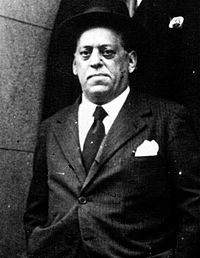Sanjurjada
| Sanjurjada | |||||||
|---|---|---|---|---|---|---|---|
 José Sanjurjo |
|||||||
|
|||||||
| Belligerents | |||||||
| loyalist troops (no specific name) | rebel troops (no specific name) | ||||||
| Commanders and leaders | |||||||
| Manuel Azana | |||||||
| Strength | |||||||
| most of the army | Seville garrison, some 300 people in Madrid | ||||||
| Political support | |||||||
| most republican and left-wing parties | some monarchist and centre-republican politicians | ||||||
| Casualties and losses | |||||||
| around 10 KIA and 20 WIA (mostly rebels) | |||||||
Sanjurjada (Spanish: [saŋxuɾˈxaða]) was a military coup, staged in Spain on August 10, 1932. Resulting mostly from corporative dissent among the army though also with some political inspiration, it was aimed at toppling the government but not necessarily at toppling the Republic. Following brief clashes it was easily suppressed in Madrid. Hardly any action was recorded elsewhere except Seville, where local rebel commander general José Sanjurjo took control for some 24 hours, but acknowledged defeat when faced with resolute governmental response. Due to his brief success and attention given during following trials, the entire coup has been later named after him.
Spanish military greeted the advent of the Republic with little enthusiasm, though also with no particular hostility. The officer corps tended to be rather monarchist than republican and rather conservative than liberal, but following last years of the dictatorship, which had compromised and discredited the army, most military men preferred to stay clear of politics. It was only when the new regime was set on a firmly leftward course and started to target the army for serious reform that voices of dissent started to be heard. A series of reforms, introduced since 1931 by the Prime Minister and the minister of war at the same time, Manuel Azaña, was aimed at scaling down an overgrown officer corps, structural reform and bringing the armed forces firmly under the civilian control. This, combined with Azaña’s patronising, if not contemptuous, rhetoric, proved fertile soil for growth of corporative disenchantment. The government confronted the dissent with few arrests, a number of personal reassignments and a handful of new regulations, which tightened its grip on the army further on.
There is little indication that growing opposition among some of the generals was fuelled by ongoing political controversies, especially the problems of agrarian reform, relations between state and church, re-defining labor regulations and ambitions of peripheral nationalisms. It was rather politicians who attempted to bank on frustration of the military, some of them second-rank Alfonsist monarchists, some of them Republicans and some of them Carlists. A contemporary scholar distinguished between 3 different lobbying groups pursuing 3 paths: a "constitutional" revolt aimed at installing a new less radical regime, a coup leading to monarchist restoration and a technical "rectification" of the Republic, equidistant between the former two. Another author suggests there were 2 strands, an Alfonsist one and a "constitutionalist" one, though initially all that was rather secondary to generally corporative nature of the growing dissatisfaction.
...
Wikipedia
